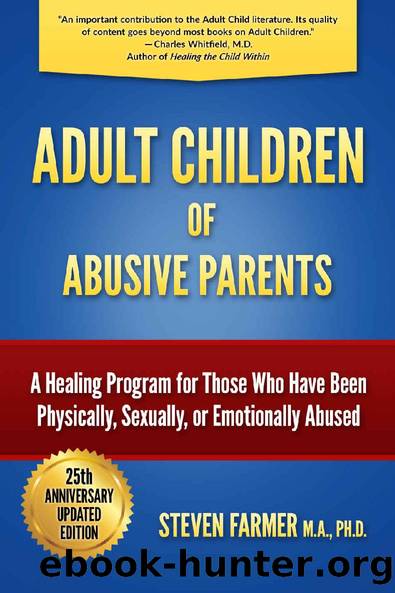Adult Children of Abusive Parents by Steven Farmer

Author:Steven Farmer [Farmer, Steven]
Language: eng
Format: epub
Publisher: Earth Magic, Inc. Publishing Company
Published: 2016-01-24T23:00:00+00:00
Acknowledging and Releasing Anger
When denial no longer works, anger often emerges. When you face up to how cruelly you were cheated out of your childhood, you will feel angry.
You may have a great deal of difficulty doing this. You associate anger with abuse because when your parents were angry, they abused you physically or emotionally. You may be afraid of losing control and behaving just like your parents did.
Maureen describes how she learned to associate anger with violence: âThatâs all Iâve known. Either things were quiet or they exploded into fighting. Everybody tiptoed around my father, because we were all afraid that if he got upset, heâd go into one of his rampages. I see today how I am still dreadfully afraid of anger â my own or anyone elseâs. I still sort of tiptoe around.â
Another reason you have denied your anger is that since childhood you have believed that the abuse was all your fault. Since you believed you were the âbadâ one, how could you justify being angry with someone who was not only bigger than you, but whom you saw as being âgoodâ and ârightâ? If you got angry at all, it was at yourself. Your anger turned inward served to punish you for being âbad.â This then led you to feel guilty and depressed.
Martha recalls how she used to deal with her anger: âWhen I was little I used to pound my head with the side of my fist if I thought I had been bad. And I heard that from my mom often enough. Nowadays I donât use a fist. I use words to beat up on myself!â
There are two important things to consider about your anger as it surfaces: First, feeling angry doesnât mean you have to do anything with it â you donât have to act it out or abuse someone. Feeling angry simply means you feel angry. Second, simply stating out loud, âI am angry,â may help you acknowledge and release that anger. Hitting something soft and inanimate, like a pillow, as you say it may help achieve the release.
Exercise: Acknowledge and release your anger.
Go back to your âI wish my mom/dad hadnâtâ¦â lists. Pick one item, close your eyes, and think back to that scene. For instance, âI wish mom hadnât yelled at me in front of my teacher at the school open house.â Picture that scene, but picture it as if you were an adult witnessing the abuse of this helpless, vulnerable child. As that adult, pay attention to your body senses. Where do you feel your tension? A tight stomach, grinding jaws, a clenched fist, and a furrowed brow all suggest anger. Notice whatever you feel. If you do feel angry and you must let it out, you can do so by kneeling at the edge of the bed and hitting the mattress as you shout, âIâm angry!â Repeat this exercise once a week for four weeks, using two different items from your lists each time.
Journal:
Record your experience of this exercise each time you do it.
Download
This site does not store any files on its server. We only index and link to content provided by other sites. Please contact the content providers to delete copyright contents if any and email us, we'll remove relevant links or contents immediately.
Toxic Parents by Susan Forward(3285)
Sapiens and Homo Deus by Yuval Noah Harari(3069)
The Gaslight Effect by Dr. Robin Stern(2792)
Borders by unknow(2309)
The Body Keeps the Score by Bessel van der Kolk MD(2215)
Cruel to Be Kind by Cathy Glass(2197)
Life After Darkness by Michelle Knight(1965)
A Child Called It by Dave Pelzer(1870)
Rethinking Narcissism by Dr. Craig Malkin(1762)
Future Design by Unknown(1571)
Next Time, She'll Be Dead by Ann Jones(1570)
Broken by Rosie Lewis(1515)
Daddy's Little Secret by Tina Davis(1505)
A Stolen Life by Dugard Jaycee(1496)
Legacy of the Heart by Wayne Muller(1491)
Running on Empty: Overcome Your Childhood Emotional Neglect by Webb Jonice(1468)
Mothers Who Can't Love by Susan Forward(1468)
Umbrella by Will Self(1453)
Healing Your Emotional Self by Beverly Engel(1372)
